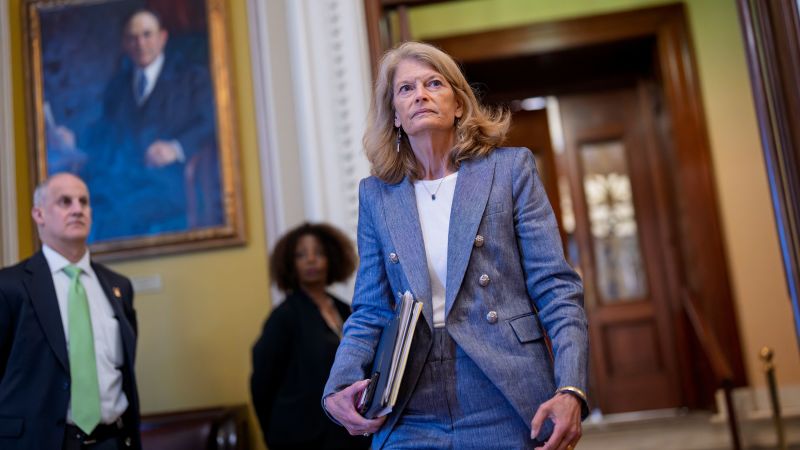
The fate of President Donald Trump’s domestic agenda hinged on Alaska Senator Lisa Murkowski, who leveraged her position to secure significant changes that would channel more federal funds to her state. The Senate passed Trump’s “big, beautiful bill” on Tuesday after a grueling 26-hour session of negotiations and amendments. Murkowski, who described her efforts as a “mighty struggle,” managed to soften the bill’s most severe funding cuts to Alaska before casting the decisive vote that ensured its passage.
The amendments Murkowski secured, including critical carveouts for Alaska, highlight the intricate process of assembling such comprehensive legislation in Washington. In a Senate divided closely along party lines, moderates like Murkowski, known for occasionally defying Trump and representing a state with an independent streak, wield significant influence.
“This is probably the most difficult and agonizing legislative 24-hour period that I have encountered,” Murkowski told reporters. “And I’ve been here quite a while, and you all know I’ve got a few battle scars underneath me. But I think I held my head up and made sure that the people of Alaska are not forgotten in this.”
The High-Stakes Vote
Murkowski’s pivotal role in the bill, which extends Trump’s 2017 tax cuts, funds his immigration crackdown, and imposes work requirements on social safety net programs, became apparent in recent days. With Republicans holding a slim 53-47 majority in the Senate, they could not afford to lose any more votes after Kentucky Senator Rand Paul and Maine Senator Susan Collins expressed their objections to specific provisions.
The GOP’s focus turned to Murkowski, and over 48 hours, she was the center of intense lobbying by prominent Republicans, including Vice President JD Vance and Senate Majority Leader John Thune. Behind closed doors, staffers were revising key sections of the bill to win her support, addressing issues like Medicaid, nutritional assistance, and even adding a tax break for whaling captains.
Key Concessions for Alaska
Murkowski has consistently voiced her concerns about the bill. During a recent town hall in Cordova, she praised certain aspects but warned against federal funding cuts to programs like Medicaid and food stamps, which could severely impact Alaska’s rural hospitals.
Efforts to increase Medicaid funding for states based on poverty rates, initially crafted to benefit only Alaska and Hawaii, were struck down by the Senate parliamentarian. Subsequent attempts to apply increased funding based on population density also failed. However, a GOP source indicated that the Centers for Medicare and Medicaid Services might have some discretion to direct funds favorably towards Alaska.
Additionally, Murkowski secured a delay in the requirement for states with high payment error rates to contribute to food stamp benefits costs. Alaska, with its high unemployment rates, also received waivers from expanded work requirements for food stamps.
“I struggled mightily with the impacts of cutting Medicaid and food stamp benefits in my state,” Murkowski stated. “That weighs very, very heavily, and so what I tried to do was to ensure that my colleagues understood what that means when you live in an area where there are no jobs. It is not a cash economy. And so I needed help and I worked to get that every single day.”
Past and Present: A History of Legislative Negotiations
Murkowski’s negotiations evoke memories of past legislative maneuvers, such as the “Cornhusker Kickback” in 2010 and the “Polar Payoff” in 2017, both designed to secure crucial votes. However, unlike those earlier efforts, it remains uncertain whether the changes Murkowski negotiated will survive as the bill returns to the House.
Murkowski, who has a history of independent political moves, including a successful write-in campaign after losing a GOP primary, has not ruled out leaving the Republican Party altogether. Her actions underscore the complex dynamics at play when individual lawmakers hold the power to influence major legislation.
“We do not have a perfect bill, by any stretch of the imagination,” Murkowski remarked. “My hope is that the House is going to look at this and recognize that we’re not there yet. And I would hope that we would be able to actually do what we used to do around here, which is work back and forth between the two bodies to get a measure that’s going to be better for the people in this country, and more particularly, for the people in Alaska.”
As the bill heads back to the House, the next steps remain uncertain. Murkowski’s efforts have highlighted the challenges and complexities of legislative negotiations, especially in a polarized political environment. The coming weeks will reveal whether her hard-won concessions will endure or if further changes are on the horizon.







